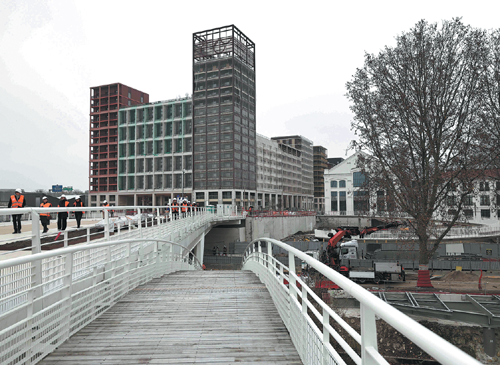From gritty, to glow-up
Run-down Paris suburb gets Olympic-sized makeover, as residents hope it will bring lasting improvements

From the windows of "Les Bons Vivants" cafe, a short walk from the athletes' village for the Paris Olympics, the changes underway in the once run-down neighborhood are instantly visible.
Next door, the makeover of the 130-meter Tour Pleyel skyscraper is nearly complete, turning the 1970s eyesore into a modern landmark that will host a four-star hotel and a pool with panoramic views.
Its private owner started the 500-million euro ($550 million) renovation in anticipation of an Olympics dividend for the Saint-Ouen area, which has been a focus of public investment for the Paris Games that will run between July 26 and Aug 11.
Around the corner from the cafe, a freshly completed apartment block, with a modern facade of concrete and wood, stands opposite relics of the past: scruffy, two-storey brick buildings hosting garages and kebab shops.
A brand-new station — Saint-Denis Pleyel — is also emerging nearby from a mass of cranes and scaffolding, destined to be a hub for four metro lines and 250,000 daily travelers.
"It's taking time, but after the Games it's going to be good," said Ethan, a fast-talking 28-year-old waiter at Les Bons Vivants. "As soon as they're finished, all the infrastructure will be for the town."
The emerging modernity outside contrasts with life inside the cafe. With its formica tables, old wooden bar and staff in traditional black waistcoats and white aprons, time appears to have stood still.
However, this meeting of old and new in Saint-Ouen is causing some tension and fear, Ethan admits.
"House prices have gone crazy and it's going to change the local population, it's undeniable," he said.
Gentrification
Saint-Ouen lies just to the north of Paris, separated from the capital by the ring road that divides the generally wealthy and mostly white center of the city from its more deprived, immigrant-heavy suburbs.
Known for its 150-year-old flea market, and for once being home to the famed Pleyel piano factory, Saint-Ouen is also associated with the modern scourges of Paris' suburbs: run-down tower blocks and drug-related crime.
The decision to place the athletes' village there and extend two metro lines into the area — another three are planned in the future — was part of the pitch for the Paris Games bid, which French authorities won in 2017.
Just as the 2012 London Olympics helped regenerate the Stratford area of the English capital, Paris organizers believe their Games will help develop Saint-Ouen and surrounding areas of the notorious Seine-Saint-Denis district.
"I guess we're part of the gentrification process," admits local resident Maite Gallen, 37, a psychologist who moved to Saint-Ouen from Paris with her husband "to have a bit more space."
"In terms of the impact of the Games, I'm skeptical," she said. "I guess it's a good thing overall, but they came here and did a big presentation about the future 'international attractiveness' of Saint-Ouen, which made me laugh.
"We're not quite there yet. You can't even find a supermarket nearby."
She hopes that the new village, which will house competitors and team officials for the Games, will bring positive changes.
The giant complex has seen private developers build nearly 3,000 new apartments that will become a mix of private, student and public housing once the Olympics and Paralympics finish.
The ground-floor spaces of the eco-friendly blocks will be given over to new commercial spaces including shops.
'An opportunity'
A kilometer away — a half-hour walk through a tangle of road and rail infrastructure — sits the Stade de France, which will host the Olympic track and field events, and is undergoing a makeover 26 years after its inauguration.
Artistic swimming, diving and water polo will take place in a new aquatics center opposite.
The Stade de France was the scene of embarrassing crowd management and policing failures in 2022, when France hosted the final of the Champions League, Europe's premier football competition.
Gangs of youths robbed and abused Liverpool and Real Madrid fans around the stadium, leading to changes in the way French security forces handle such events.
In a stark reminder of local crime problems, two teenagers were stabbed and beaten to death last week just to the north, in the historic Saint-Denis area.
"I was born here, but things have changed a lot, and not in a good way," Malika Madjour, 78, told AFP near the 12th century Saint-Denis Basilica, where generations of France's former royal family are buried.
"I hope the Olympics are going to offer up another image of Saint-Denis," said the retired lawyer, whose parents moved to France during the first major wave of North African immigration in the 1940s and 50s.
"It's an extraordinary opportunity for the town."
AFP

Today's Top News
- Shared Journey: Chinese new energy vehicles in Europe: competition or co-creation?
- Deep sea needs down-to-earth scientific research
- Deeper opening-up promised for steady growth
- China to rebalance growth with domestic demand boost
- Consultative suggestions provide policymakers with essential inputs to finalize five-year plan
- Decoding China: How the people run the country






























